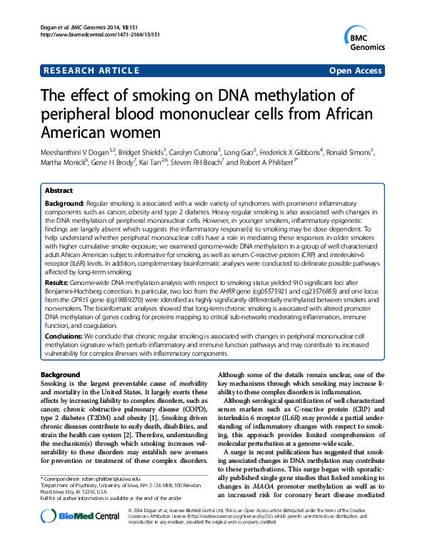
Article
The effect of smoking on DNA methylation of peripheral blood mononuclear cells from African American women
BMC Genomics
Document Type
Article
Disciplines
Publication Date
2-22-2014
DOI
10.1186/1471-2164-15-151
Abstract
Background
Regular smoking is associated with a wide variety of syndromes with prominent inflammatory components such as cancer, obesity and type 2 diabetes. Heavy regular smoking is also associated with changes in the DNA methylation of peripheral mononuclear cells. However, in younger smokers, inflammatory epigenetic findings are largely absent which suggests the inflammatory response(s) to smoking may be dose dependent. To help understand whether peripheral mononuclear cells have a role in mediating these responses in older smokers with higher cumulative smoke exposure, we examined genome-wide DNA methylation in a group of well characterized adult African American subjects informative for smoking, as well as serum C-reactive protein (CRP) and interleukin-6 receptor (IL6R) levels. In addition, complementary bioinformatic analyses were conducted to delineate possible pathways affected by long-term smoking.
Results
Genome-wide DNA methylation analysis with respect to smoking status yielded 910 significant loci after Benjamini-Hochberg correction. In particular, two loci from the AHRR gene (cg05575921 and cg23576855) and one locus from the GPR15 gene (cg19859270) were identified as highly significantly differentially methylated between smokers and non-smokers. The bioinformatic analyses showed that long-term chronic smoking is associated with altered promoter DNA methylation of genes coding for proteins mapping to critical sub-networks moderating inflammation, immune function, and coagulation.
Conclusions
We conclude that chronic regular smoking is associated with changes in peripheral mononuclear cell methylation signature which perturb inflammatory and immune function pathways and may contribute to increased vulnerability for complex illnesses with inflammatory components.
Rights
This is an Open Access article distributed under the terms of the Creative Commons Attribution License (http://creativecommons.org/licenses/by/2.0), which permits unrestricted use, distribution, and reproduction in any medium, provided the original work is properly credited.
Copyright Owner
Dogan et al
Copyright Date
2014
Language
en
File Format
application/pdf
Citation Information
Meeshanthini V. Dogan, Bridget Shields, Carolyn E. Cutrona, Long Gao, et al.. "The effect of smoking on DNA methylation of peripheral blood mononuclear cells from African American women" BMC Genomics Vol. 15 (2014) p. 151 Available at: http://works.bepress.com/carolyn_cutrona/10/

This article is from BMC Genomics 15 (2014): 151, doi:10.1186/1471-2164-15-151.